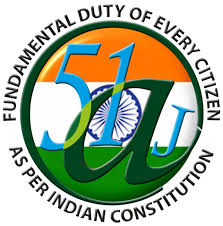FUNDAMENTAL DUTIES
Originally, the constitution of India did not contain any list of fundamental duties. In other words, enjoyment of fundamental rights was not conditional on the performance of fundamental duties.
Democratic rights are based on the theory that rights are not created by the state. Individuals are born with right. It is on this theory that the Indians before independence raised the slogan that “freedom is our birth right.” It is in this sense again that Prof. Laski asserts that the “state does not create rights, it only recognizes rights.”
Article 51A, Part IVA of the Indian Constitution, specifies the list of fundamental duties of the citizens. It says “it shall be the duty of every citizen of India:
- to abide by the constitution and respect its ideal and institutions;
- to cherish and follow the noble ideals which inspired our national struggle for freedom;
- to uphold and protect the sovereignty, unity and integrity of India;
- to defend the country and render national service when called upon to do so;
- to promote harmony and the spirit of common brotherhood amongst all the people of India transcending religious, linguistic and regional diversities, to renounce practices derogatory to the dignity of women;
- to value and preserve the rich heritage of our composite culture;
- to protect and improve the natural environment including forests, lakes, rivers, and wild-life and to have compassion for living creatures;
- to develop the scientific temper, humanism and the spirit of inquiry and reform;
- to safeguard public property and to abjure violence;
- to strive towards excellence in all spheres of individual and collective activity, so that the nation constantly rises to higher levels of endeavor and achievement.
Further, one more Fundamental duty has been added to the Indian Constitution by 86th Amendment of the constitution in 2002.
11.who is a parent or guardian , to provide opportunities for education to his child, or as the case may be, ward between the age of six and fourteen years.
